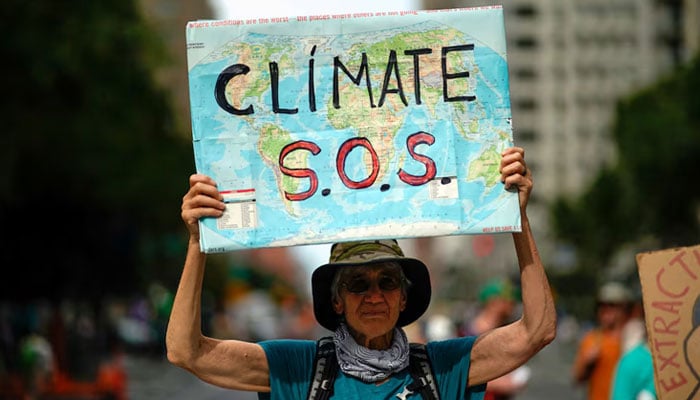To keep climate ambition alive
Timing could not be worse, in Global South, crisis is no longer abstract threat; it is reality
The year 2025 was meant to be a year of renewed climate ambition. The world had a roadmap with the third round of Nationally Determined Contributions (NDCs) due and COP30 on the horizon in Brazil. But instead of converging on solutions, geopolitical fractures are widening, threatening the very foundation of the Paris Agreement.
As the world crossed the February 2025 deadline for submitting Nationally Determined Contributions (NDCs 3.0), the spirit of the Paris Agreement appears to be faltering. The recent withdrawal of the US from key international climate forums is a sharp reversal under its latest leadership and has sent a chilling signal through the global climate community. And it’s not just Washington; a quiet disillusionment is setting across capitals from Brasilia to Delhi. This retreat comes at a critical moment, with over 120 countries still due to update their NDCs, according to UNFCCC tracking.
This erosion of momentum comes at a time when the world should be rallying towards COP30, a pivotal milestone set to take place in Brazil later this year. COP30, scheduled in Belem, Brazil, is the first major summit after the Global Stocktake and is responsible for converting assessment into action. It was expected to catalyse climate finance delivery, strengthen carbon pricing cooperation, and address implementation shortfalls. Yet the mood is drifting from ambition to damage control. Instead of being a moment of renewed ambition and solidarity, the road to COP30 feels increasingly uncertain. Once the flagship forum to anchor climate progress, the COP process now risks becoming a symbolic ritual, its political leverage weakened by fractured alliances and wavering commitments.
The timing could not be worse. In the Global South, the crisis is no longer an abstract threat; it is reality. South Asia recorded its hottest March in over a century this year, with brutal heatwaves pushing thermometers past 47 C. Widespread hailstorms and drought have decimated crops, displaced millions, and pushed food and water systems to the brink. According to the UN, over 40 million people faced climate-induced resource insecurity in 2024 alone.
For countries already struggling with fragile economies and post-pandemic recoveries, the retreat of global climate leadership feels like betrayal. The Paris Agreement was built on a simple promise: while ambition would be nationally determined, solidarity would be globally assured. The first round of NDCs in 2015 marked an unprecedented convergence around climate goals. Despite the COVID-19 pandemic, the 2020 updates (NDCs 2.0) showed modest ambition increases. But NDCs 3.0 are unfolding in a fractured global context, casting doubt on collective progress. Today, that assurance is eroding fast.
The risk is now crystal clear. Today, that assurance is eroding fast. Despite repeated pledges, the OECD’s longstanding $100 billion annual climate finance commitment due since 2020 remains unmet, undermining trust between the Global North and Global South.
Without a major course correction, NDCs 3.0 will become less of a rallying point and more of a fragmented, uneven patchwork. Some countries will delay submission. For instance, Indonesia has backtracked on its earlier coal phaseout timeline, while India’s latest update emphasises energy security over mitigation targets. In countries like Pakistan, the fiscal strain and energy crisis have delayed policy reforms needed to align with 1.5 C. Others will water down ambition. And the gap between those vulnerable to climate impacts and those capable of funding resilience will only widen.
Yet despite this grim outlook, there remains a window of opportunity if the right players step up.
Waiting for Washington to re-engage for the Global South is no longer a viable strategy. Instead, countries must look inward and to each other, forging regional and economic alliances that anchor climate ambition in developmental needs. Already, frameworks like the Vulnerable Twenty (V20) Group, AOSIS, and the African Union’s Green Growth Initiatives offer models for how developing nations can pool diplomatic capital and financing demands.
In this new world order, NDCs must serve dual purposes: as blueprints for decarbonisation, yes, but also as national development plans, linked explicitly to energy access, job creation and food security. Climate diplomacy must become a development diplomacy.
South-South cooperation must deepen. Emerging economies need to tap into voluntary carbon markets now valued at over $2 billion in 2024, according to Ecosystem Marketplace. Launch regional emissions trading systems, and use carbon finance to mitigate emissions and build resilience. The other pillar that must hold is Europe. With the US stepping back, Europe faces a stark choice: assume a leadership mantle it did not seek or watch the climate regime it helped build unravel.
The European Union, which has long championed the Green Deal, carbon markets, and climate finance, must now move beyond rhetoric. Europe must decisively bridge the growing ambition gap: scaling up climate finance delivery, expanding access to adaptation funds, and providing technical support to developing nations racing to meet NDC requirements.
Just as importantly, Europe must champion new forms of diplomacy: mini-lateral coalitions, regional green deals, and peer-to-peer partnerships between cities, industries, and civil societies. In an era of fragmented geopolitics, decentralised climate action is no longer a luxury but a necessity.
The challenge ahead demands a different kind of diplomacy that is faster, more flexible and more grounded in mutual interests. Climate action must be reframed not merely as an environmental imperative, but as a path to economic sovereignty, energy security and future prosperity.
Instead of relying on grand, universal declarations, the coming years must be defined by targeted, strategic agreements, such as Africa-Europe green hydrogen partnerships, South Asia-Pacific carbon market linkages, and Asean-led electric vehicle supply chain initiatives. Examples already emerging include the EU-Africa Green Hydrogen Compact, ASEAN-led battery supply chains and the Latin American Voluntary Carbon Market Platform. These illustrate how mini-lateral diplomacy can complement the weakening central process.
This ‘patchwork multilateralism’ might seem messy compared to the universalist aspirations of 2015, but it might be the only way forward. NDCs 3.0 will be a global test – not just of national ambition but of whether the world’s most vulnerable and the world’s most capable can still find common cause in the climate fight.
To re-anchor the global climate process, three priorities are essential: one, launching a Global South Climate Finance Compact to scale public-private flows; two, institutionalising an annual Adaptation COP to focus on resilience gaps; and three, supporting regional carbon market frameworks that integrate development co-benefits.
The collapse of American climate leadership was a shock, but the erosion of global climate ambition is not inevitable. It is a political and moral choice. For the Global South and Europe, the path forward lies in adapting diplomacy, deepening regional cooperation, and holding the 1.5 C line not through declarations, but through deals, delivery and dignity.
The writer leads the Pakistan Industrial Decarbonization Program at the Sustainable Development Policy Institute (SDPI). She tweets/posts @SalehaSqureshi and can be reached at: Saleha@sdpi.org
-
 Can App Stores Really Keep Kids Off Social Media? Here’s What Experts Says
Can App Stores Really Keep Kids Off Social Media? Here’s What Experts Says -
 Margot Robbie Fears Being Dubbed A 'dumb Blonde' Due To Major Reasons: 'Hates The Idea'
Margot Robbie Fears Being Dubbed A 'dumb Blonde' Due To Major Reasons: 'Hates The Idea' -
 How Kate Middleton's Hyperemesis Gravidarum Left Her 'not The Happiest'
How Kate Middleton's Hyperemesis Gravidarum Left Her 'not The Happiest' -
 USA Beats Canada For First Olympic Hockey Gold In 46 Years; Donald Trump, Barack Obama & Others Hail Historic Victory
USA Beats Canada For First Olympic Hockey Gold In 46 Years; Donald Trump, Barack Obama & Others Hail Historic Victory -
 Claressa Shields Defeats Franchon Crews-Dezurn In Heavyweight Title Rematch
Claressa Shields Defeats Franchon Crews-Dezurn In Heavyweight Title Rematch -
 Sam Altman Calls Elon Musk’s Space Data Center Plan ‘ridiculous’
Sam Altman Calls Elon Musk’s Space Data Center Plan ‘ridiculous’ -
 Kara Braxton, WNBA All-Star And Champion, Dies At 43
Kara Braxton, WNBA All-Star And Champion, Dies At 43 -
 Anthropic Lead Engineer Predicts ‘software Engineer’ Role Can Disappear By 2026
Anthropic Lead Engineer Predicts ‘software Engineer’ Role Can Disappear By 2026 -
 Sharon Details Late Husband Ozzy's Final Days During His Sickness
Sharon Details Late Husband Ozzy's Final Days During His Sickness -
 Magic Vs Clippers: Clippers Announce Kawhi Leonard Status After Exit
Magic Vs Clippers: Clippers Announce Kawhi Leonard Status After Exit -
 BTC Price Today: Bitcoin Sinks Below $65K On Trade Uncertainty
BTC Price Today: Bitcoin Sinks Below $65K On Trade Uncertainty -
 'A Knight Of The Seven Kingdoms': All You Need To Know About The Finale
'A Knight Of The Seven Kingdoms': All You Need To Know About The Finale -
 NYC Travel Ban: Mamdani Shuts Down Roads Amid Blizzard Conditions
NYC Travel Ban: Mamdani Shuts Down Roads Amid Blizzard Conditions -
 Alicia Keys Celebrates 25 Years Of Breakout Single ‘Fallin’’
Alicia Keys Celebrates 25 Years Of Breakout Single ‘Fallin’’ -
 Akinola Davies Jr. Gives His Immigrant Parents A Shoutout In 2026 BAFTAs Acceptance Speech
Akinola Davies Jr. Gives His Immigrant Parents A Shoutout In 2026 BAFTAs Acceptance Speech -
 Princess Beatrice, Eugenie Told 'first Thing They Should Do' After Andrew Arrest
Princess Beatrice, Eugenie Told 'first Thing They Should Do' After Andrew Arrest




